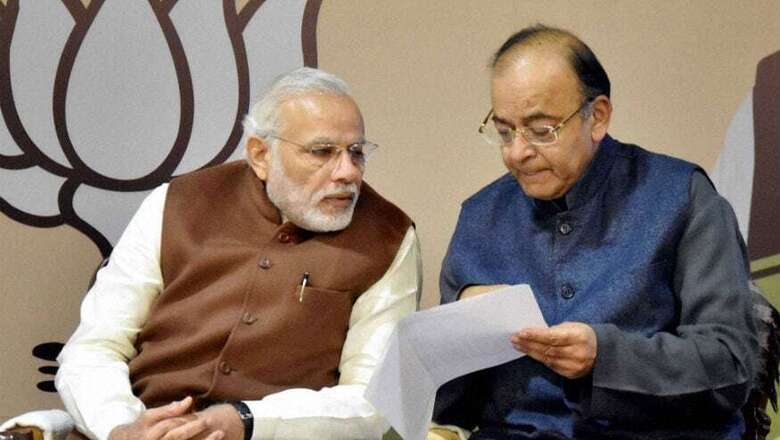
views
New Delhi: Opposition leaders, taking the Gujarat election campaign a notch higher, have accused the Modi government of making savings in bank accounts unsafe by allowing banks to use the deposits for recapitalization in case of a financial setback.
While the national bank employee unions' threat to go on strike only added to the panic, PM Modi and Finance Minister Arun Jaitley quickly came forward to reassure the people that they will “never put their hard-earned money at risk”.
It was during the Parliament’s Monsoon Session that the Financial Resolution and Deposit Insurance (FRDI) Bill was introduced and has gone through rigorous public debates since then. A joint Parliamentary committee is currently studying the draft Bill and is expected to come out with a report, following which it is likely to be taken up for legislative approval in the Parliament.
However, the concerns of consumers and bank employees have raised some pertinent questions.
Banks have been forever known to be cornerstones of financial security. But with the current Bill in contention, several bank employees on condition of anonymity said that “the very foundation of financial security is being questioned.”
The bill provides for a bail-in option, which means depositors could lose control of their money which would be converted into securities such as shares in the bank in case the bank’s financial situation deteriorates. Simply put, banks will be using depositor’s money to recoup.
“The bill has it that banks in case of a financial breakdown can use depositor’s money to re-strengthen themselves and the cash will be converted into securities that can later be monetized. However, what if the bank never recovers?” said D.K.Srivastava, chief policy advisor at EY, a consultancy firm.
Banking unions have also opposed this bill for a variety of reasons. The unions said in a joint statement in November that “the proposed law will open up public sector banks for liquidation or amalgamation, which could put the deposits of customers under severe risk. Worse, provisions dealing with deposit insurance are ambiguous in the draft law, with no explanation on the amount to be insured by the banks.”
Under the current law, deposits of up to Rs 1 lakh, including interest, are protected by the insurance cover that the bank provides. This means that payment of deposits upto Rs 1 lakh is guaranteed even if the bank sinks. Anything over and above Rs 1 lakh does not have this protection, which means there is a possibility that a bank account holder with a large deposit might lose a lot of money if a bank cripples.
However, this has never happened since 1961.
Finance Minister Arun Jaitley, in last budget speech said, “The government is keen on setting up a framework that would instil better financial discipline among banking institutions and make stronger provisions to protect public money.”
Following the announcement, a committee under Ajay Tyagi, additional secretary of the Department of Economic Affairs, was set up in March last year. The committee released the draft law in September 2016. The Union Cabinet cleared the Bill in June this year, which was later tabled in the Parliament in August.
Political parties, including the Congress and the Trinamool Congress have gone whole hog in refuting the Bill citing public money risks involved in operationalising it.
Arun Jaitley faced with resistance, said in a press conference on Tuesday that public money will be protected and depositors need not worry.
The Bail-in Clause
The bail-in clause included in the proposed law is one provision that directly and immediately affects depositors.
According to the bail-in clause, creditors of the bank would have to bear a part of the loss in case the financial institution sinks. All depositors are considered creditors in banking terms.
Abhishek Poddar, Partner A T Kearney feels this is perhaps an improvement from the existing scenario, where amounts over Rs 1 lakh would be lost completely. “Your money will be converted into a security instead of being lost,” said Poddar.
Those opposing the new law argue that its fundamental idea is to transfer the burden of non-performing assets created by corporate defaulters to the common people.
“It is fairly deducible that the corporate defaulters will be eased off only to pass on the burden to the depositors,” added Srivastava.
The banking sector is under stress due to bad loans and according to the RBI's Financial Stability Report released in June 2017, the gross non-performing advances (GNPAs) ratio of all banks stood at 9.6% as of March 2017. The RBI had recommended that banks initiate insolvency proceedings for 12 large defaulters, constituting 25% of the system’s NPAs.
While the provisions of the Bill ensure stability in the financial sector and resolution of issues in a time-bound manner, interests of bank depositors sure need a revisit.


















Comments
0 comment